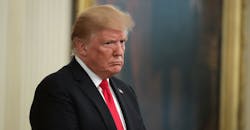Trump Lashes Out After Automakers Agree to California's Standards
President Donald Trump lashed out at automobile manufacturers who’ve pushed back on his administration’s plan to weaken fuel-efficiency requirements, dismissing them as “politically correct.”
“My proposal to the politically correct Automobile Companies would lower the average price of a car to consumers by more than $3000, while at the same time making the cars substantially safer,” Trump said in a tweet on Wednesday. “Engines would run smoother. Very little impact on the environment! Foolish executives!”
The tweet was apparently prompted by a compromise that Ford Motor Co. (IW500/3), Honda Motor Co., BMW AG and Volkswagen AG have reached with California’s clean-air regulator to boost the fuel efficiency of autos sold in the U.S. through 2026, defying the Trump administration’s plan. Gavin Newsom, California’s Democratic governor, has called on other automakers to join the pact though none have thus far.
That deal represents the most clear-cut example of auto industry unease with the Trump administration’s August 2018 proposal to dramatically ease fuel economy and vehicle greenhouse gas emissions standards drafted by the Obama administration, which sought to boost average fuel efficiency to roughly 50 miles per gallon by 2025.
The Trump administration instead recommended capping mileage requirements at a 37-mile-per-gallon fleet average after 2020, and revoking California’s authority to regulate tailpipe greenhouse gas emissions, which it’s done in coordination with Washington for several years.
Trump regulators have argued that capping fuel economy standards at 2020 levels would lead to less-expensive new cars than under the current rules, allowing consumers to replace their older vehicles with newer, safer ones more rapidly and avoid thousands of traffic fatalities.
Experts and EPA career staff have disputed those assertions.
Automakers for months have urged the Trump administration to moderate that plan, fearing a lengthy legal battle over California’s regulatory powers would throw the critical standards into uncertainty for years. Those efforts have had little sway so far on the White House, which rejected a plea by 17 carmakers last month to work out a compromise with California.
The companies also want to avoid a split market -- with federal mileage requirements in most states and more stringent rules in more than a dozen states that adhere to California’s standards. The states that follow California standards account for more than a third of all U.S. auto sales.
By Ryan Beene
About the Author
Bloomberg
Licensed content from Bloomberg, copyright 2016.
